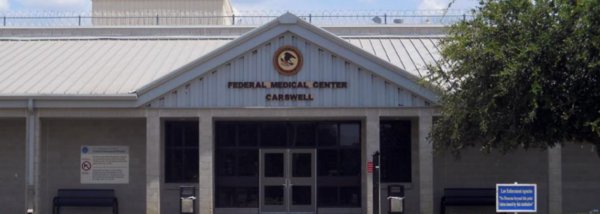
- Details
- By Native News Online Staff
FORT WORTH, Texas — The first federal female inmate to die from the coronavirus passed away yesterday, according to the U.S. Bureau of Prisons (BOP). She was identified as Andrea Circle Bear, 30, who was a tribal citizen of the Cheyenne River Sioux Tribe.
A resident of Eagle Butte, S.D., Circle Bear, who was pregnant, was transferred to BOP custody on March 20, 2020 from the Winner City Jail in Winner, S.D. to the Federal Medical Center (FMC) Carswell in Fort Worth, Texas. Circle Bear was serving a 26-month sentence for Maintaining a Drug Involved Premise.
Upon arriving at FMC Carswell, Circle Bear was immediately placed on quarantine status. Eight days later, on Saturday, March 28, she was taken to a local hospital due to concerns regarding her pregnancy, according to a press release issued yesterday by the BOP.
Circle Bear was discharged that same day. However, on March 31, she was examined by FMC Carswell Health Services staff due to a fever, dry cough and other symptoms and was then taken back to the local hospital, where she was placed on a ventilator.
On Wednesday, April 1, 2020, Circle Bear’s baby was born by cesarean section. On Saturday, April 4, 2020, Circle Bear was confirmed positive for COVID-19.
On Tuesday, April 28, 2020, Ms. Circle Bear, who had a pre-existing medical condition which the CDC lists as a risk factor for developing more severe COVID-19 disease, was pronounced dead by hospital staff.
FMC Carswell is an administrative facility that currently houses 1625 female offenders.
Native News Online reached out to the Cheyenne River Sioux Tribe, but did not receive a statement prior to publication time. This story will be updated if the tribe offers a comment.
More Stories Like This
Native News Weekly (August 25, 2024): D.C. BriefsUS Presidents in Their Own Words Concerning American Indians
This Day in History — Dec. 29, 1890: Hundreds of Lakota Killed During the Wounded Knee Massacre
Monday Morning (December 29, 2025): Articles You May Have Missed This Past Weekend
Native News Weekly (December 28, 2025): D.C. Briefs
Help us defend tribal sovereignty.
At Native News Online, our mission is rooted in telling the stories that strengthen sovereignty and uplift Indigenous voices — not just at year’s end, but every single day.
Because of your generosity last year, we were able to keep our reporters on the ground in tribal communities, at national gatherings and in the halls of Congress — covering the issues that matter most to Indian Country: sovereignty, culture, education, health and economic opportunity.
That support sustained us through a tough year in 2025. Now, as we look to the year ahead, we need your help right now to ensure warrior journalism remains strong — reporting that defends tribal sovereignty, amplifies Native truth, and holds power accountable.
 The stakes couldn't be higher. Your support keeps Native voices heard, Native stories told and Native sovereignty defended.
The stakes couldn't be higher. Your support keeps Native voices heard, Native stories told and Native sovereignty defended.
Stand with Warrior Journalism today.
Levi Rickert (Potawatomi), Editor & Publisher

